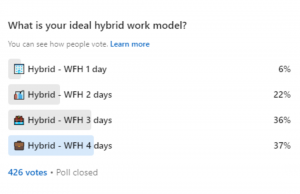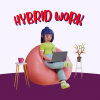A Changing Landscape: The Hybrid Work Model in Ireland
The Rise of Hybrid Work in Ireland
Ireland’s transition to hybrid work has been nothing short of remarkable. According to a report by commercial property group BNP Paribas Real Estate Ireland, a quarter of Ireland’s workforce now operates from home most of the time. This shift is particularly significant, given that in 2019, only 7% of workers regularly worked from home. The Netherlands may lead in remote work percentage, but Ireland stands out for its rapid adaptation.
The Impact of Hybrid Work
The move to hybrid work has consequences. With more employees working from home, companies have adopted hot-desking and rostering systems, reducing the office space required per employee. This transformation has implications for the demand for office space, potentially reshaping the idea of office based work. Companies are prioritising quality over quantity when it comes to office space, aligning with sustainability goals and the need to enhance the employee experience.
Job Growth and Desk-Based Sectors
Interestingly, despite the shift towards remote work, some desk-based sectors in Ireland have experienced job growth. About 27.9% of employees work in desk-based sectors, higher than the EU average. The number of desk-based jobs in Ireland has risen by 15% since the COVID-19 pandemic started in 2020, a growth rate significantly higher than the EU average of 6.9%. This indicates that certain industries in Ireland continue to rely heavily on office-based work, even as hybrid work gains prominence.
Our LinkedIn Poll
To understand Ireland’s preferred hybrid work model, we conducted a LinkedIn poll. Respondents voted for their ideal hybrid work model:
Hybrid – WFH 1 day: 6%
Hybrid – WFH 2 days: 22%
Hybrid – WFH 3 days: 36%
Hybrid – WFH 4 days: 37%
From 426 votes, these results provide a snapshot of how Ireland envisions its future work model. It’s clear that there is no one-size-fits-all approach, as preferences vary among respondents. However, the majority seem to favour a significant level of remote work, with 73% choosing options that include at least two days of working from home.
Differing Opinions: Managers vs. Employees
Productivity
A glaring disparity in opinions has emerged, setting managers and employees on opposing ends of the spectrum. There is a striking disagreement regarding remote work’s impact on productivity. Managers tend to perceive it as a detriment, while employees passionately argue that it significantly boosts their output.
Perspectives
This rift largely hinges on how each group defines productivity. Employees often include commuting time in their calculations, deeming remote work a productivity enhancement due to the elimination of daily commutes. Managers, conversely, discount commuting time and focus solely on the daily workload, leading to their differing perspective.
Consequences
Beyond productivity, this discord extends to disciplinary consequences and company policies. Employees generally view working from home on designated office days as inconsequential, whereas managers often regard it as grounds for potential termination. These differences highlight the pressing need for clear remote work policies.
Achieving Alignment: The Organised Hybrid Approach
Anchor Days
To bridge the gap and create a unified approach to remote work, an organised hybrid model emerges as a solution. In this framework, companies designate two or three “anchor” days each week for mandatory in-office attendance. These days encompass essential meetings, group activities, training sessions, and team gatherings to underline the value of physical presence.
Balance
Enforcing attendance on anchor days ensures a balanced work model. Simultaneously, managers should actively encourage remote work on non-anchor days, providing employees with the flexibility to enjoy the benefits of remote work without missing out on the value of in-person collaboration.
United Approach
The organised hybrid approach offers a path to alignment in Ireland’s evolving work landscape. By embracing this model, both managers and employees can unite in shaping the future of work, fostering a harmonious and productive work environment.
Embracing a New Era of Work
Ireland’s rapid embrace of the hybrid work model reflects its adaptability and responsiveness to changing work dynamics. The journey towards hybrid work has implications for the workforce’s evolving preferences. As Ireland continues to navigate this changing landscape, understanding the ideal hybrid work model becomes crucial for organisations seeking to attract and retain talent in this new era of work. The future of work in Ireland is undoubtedly marked by flexibility and choice, empowering employees to strike a balance that suits their lifestyles and productivity.









